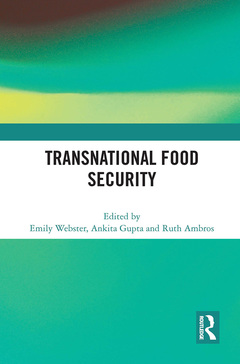Transnational Food Security
Coordonnateurs : Webster Emily, Gupta Ankita, Ambros Ruth

Transnational Food Security addresses food security from an international relations, political economy and legal perspective analysing the relationship between food security and the environment and climate change, trade, finance and contracts, and the intersection between food and human rights.
The topic of food concerns one of the most basic and profound aspects of human survival. Universal and equal access to food is, at the same time, ridden with problems of power, inequality, distribution and implicated in old and new geopolitical conflicts. As such, ?food? and food security are central to conditions of poverty and hunger, development and ?modernisation?, transitional justice and rule of law reform around the world. As a problem of critique and scholarly inquiry, food prompts an inter-disciplinary assessment of the nature of food security in the modern world. The contributors to this book take us deep into the complexity of food and illustrate the challenges of adequately understanding and approaching questions of food security and food sovereignty in a globally interconnected world.
Transnational Food Security will be of great interest to scholars of international relations, political economy, and transnational law. The chapters were originally published as a special issue of Transnational Legal Theory Journal.
1. Introduction: transnational food (in)security Emily Webster and Peer Zumbansen 2. At the brink of famine in conflict and natural disaster zones: human rights approach to extreme hunger and malnutrition Hilal Elver 3. Third world sovereignty, indigenous sovereignty, and food sovereignty: living with sovereignty despite the map Michael Fakhri The Environment and Climate Change 4. The effects of oil pollution on the marine environment in the Gulf of Guinea—the Bonga Oil Field example Ifesinachi Okafor-Yarwood 5. Compromised collaborations: food, fuel, and power in transnational food security governance Matthew Canfield 6. International law and feeding the world in times of climate change Anne Saab 7. GMO risks, food security, climate change and the entrenchment of neo-liberal legal narratives Giulia Claudia Leonelli Trade and the Financialisation of Food 8. Financialisation of the transnational food chain: from threat to leverage point? Tomaso Ferrando 9. The World Trade Organization between law and politics: negotiating a solution for public stockholding for food security purposes Matias E Margulis 10. Transnational legal methodology and domestic markets for food Amy J. Cohen 11. Commodity derivatives, contract law, and food security Anna Chadwick Food Security/Sovereignty: A Challenge for Human Rights 12. The rise of new rights for peasants. From reliance on NGO intermediaries to direct representation Priscilla Claeys 13. Engendering the right to food? International human rights law, food security and the rural woman Joanna Bourke Martignoni 14. The UN Committee on World Food Security’s break from the agricultural productivity trap Nadia Lambek
Emily Webster is a Senior Research Fellow at the Transnational Law Institute at King’s College London, with an LLM in Transnational Law from King’s College London and an LLB from Bournemouth University.
Ankita Gupta is as aspiring lawyer in Toronto, with a JD from Osgoode Hall Law School and BBA from the University of Toronto.
Ruth Ambros is a mother and aspiring lawyer in Toronto, with a JD from Osgoode Hall Law School and a BA from the University of Waterloo.
Date de parution : 06-2024
15.6x23.4 cm
Date de parution : 03-2020
15.6x23.4 cm
Thèmes de Transnational Food Security :
Mots-clés :
Food Sovereignty; Civil Society; Transnational Legal Theory; Food Sovereignty Movement; food security; Cfs; Food Insecurity; human rights; UN; environmental change; International Public Law; climate change; Global Food Crisis; environmental law; International Humanitarian Law; Neoliberalism; Transnational Law; International Law; international relations; political economy; Global Food Security Governance; trade; finance; Transnational Food; food contracts; Food Sovereignty Narrative; food and human rights; CEDAW Convention; WTO Law; famine; Neoliberal Food Regime; poverty; Commodity Derivative Markets; hunger; OTC Derivative; Third world sovereignty; Transnational Retail Corporations; Commodity Derivatives; transnational food chain; Arctic Council; contract law; TRIPs Agreement



